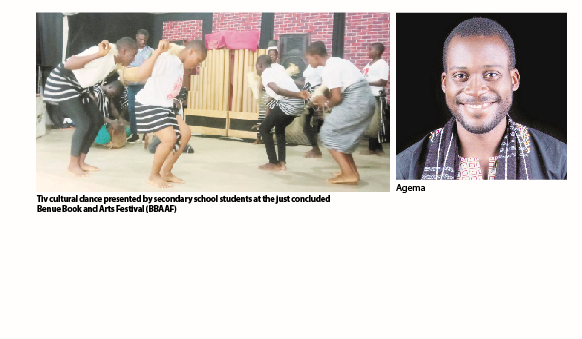At the fourth edition of the Benue Books and Arts Festival (BBAAF), although attendance appeared thinner than usual and a half of the guest artistes were absent, the conversations, which are relevant to contemporary times flowed freely and intelligently, alongside the inclusion of generation youths.
With focus on the theme, “Art and the Convergence”, the festival explored the impact of arts convergence in a society and the quest for a more inclusive literary art space to accommodate the performative arts practice and practitioners in Nigeria.
Highpoints of the conversations were multiple fold and include the forum with the two professors and authors, Dul Johnson and E.E Sule, with young writers and poets as they shared thoughts and ideas on the challenges of contemporary Nigerian literature.
Contemporary literary challenges encountered by young writers included the misperception of performance poetry and spoken word as a lesser form of literary arts, leading to their exclusion in major literary competitions like NLNG Prize for Literature, and the Association of Nigerian Authors (ANA) Prize awards.
There is also the inflexible and ineffective tertiary institutes’ curriculum that limits literary studies to modern and first-generation literary writers as Chinua Achebe, Wole Soyinka, Niyi Osundare whilst overlooking younger authors as Chimamanda Adichie, Chuma Nwokolo whose works hold much influence in today’s society.
On the other hand, there is the case of lazy millennia’s artistes and lecturers who, Prof Sule noted, were too much in a hurry to publish, or the latter that were too lazy to explore the institutional loopholes to design course works that update literary studies texts to feature literatures no older than a decade post its publication.
Conversation also looked at the impact of art and art convergence spaces such as BBAAF in the society, from whence it was established that while art might not cause sweeping changes as that of a revolution, but thrived in bite-size changes that impact life all the same.
Likewise, literature and activism, Prof Sule added, could only effect political revolution when critical perspective and pockets of physical movements were carried out to transfer electronic advocacy to the real-life campaigns.
As an arts convergence forum, “BBAAF is a very welcome development. I think in spite of the numbers this year, it has been as successful as the first edition. The purpose for which we have gathered here has been achieved.
“Look at the energy of young people at the festival. I didn’t think they would follow my train of thoughts, but by the end of the keynote address, the questions they threw at me, made me realize that this is an intelligent kind of convergence. You see, the workforce of the country come from these kinds of people. The future of Nigeria depends on these kinds of people. The more their minds are moulded positively, the better we will be. The rising awareness in the arts for young people is something I feel very good about, and that is something I think will also bring about change,” said the don.
The festival further saw the inclusion of not just young writers and poets via its N110,000 Prize Poetry Slam, but the attraction and building of budding talents in the literary arts with the inclusion of secondary school students in a drama presentation competition.
The 15 minutes performance focused on sexual and gender-based violence (SGBV) which saw six schools battle for the first, second and third positions, tested their acting skills, vocal projection, enunciation and their application of thematic issues in drama.
As mundane as the presentations were, efforts of some schools as the Girls Government College GGC, Makurdi, Peniel College and Government Secondary School, to display better acting, stage management and projection was quite promising. Also gratifying was the festival’s recognition of the Best Actors and Actresses awards, much to the youngsters’ surprise. The happiness of the awarded students at the recognition of their budding talents made the time and efforts put in by the jury, and in festival’s planning worthwhile.
To double down on its impact, BBAAF requires devoted support and funding. Fans of the festival testified to lesser attendance this year compared to previous editions. Meantime, there is zero to low local awareness of the festival, an absence of half of the guest artistes scheduled to participate in the festival, and the absence of a virtual setting of the festival, which limited local and international participation.
While there are no empirical data to back up its impact, Eunice Spring Life Foundation (ESLF) early partners of the festival, whose core objective of literacy promotion fits that of BBAAF noted, “Qualitatively speaking, I have heard testimonies and reviews of how BBAAF has availed young and aspiring writers the opportunity to showcase and hone their writing skills. It has given young performers, poets and spoken word artistes, the platform to showcase their work and opportunities for promotion. I see BBAF as that hub where those with experience are impacting the lesser experienced, and the less experienced also benefit from them to improve their skills and reach their potential,” said ESLF Programme Director, Tine Aghenor.
Hence, in-kind support as that of the foundation, by way of staff support, logistics provisions and transportation; in addition to financial, even tech support should be channelled to such a platform that impacts Nigerian youths, while simultaneously building the critical thinking of the future leaders of our nation cannot be overstressed.
Founded in 2019 by Sevhage Publishers and Sevhage Literary & Development Initiative, Benue Book and Arts Festival (BBAAF) is one among the handful of popular literary festivals in Nigeria, such as Ake Book and Arts Festival, Lagos Book and Arts Festival (LABAF), Kaduna Book and Arts Fest (KADAFEST) that reviews relevance of literary arts in contemporary African and Nigerian and charts literary trends and practices nationally and internationally. Besides the literary workshops, keynote addresses and panel discussions, the festival holds several art contests that impact positively to the literary arts.




